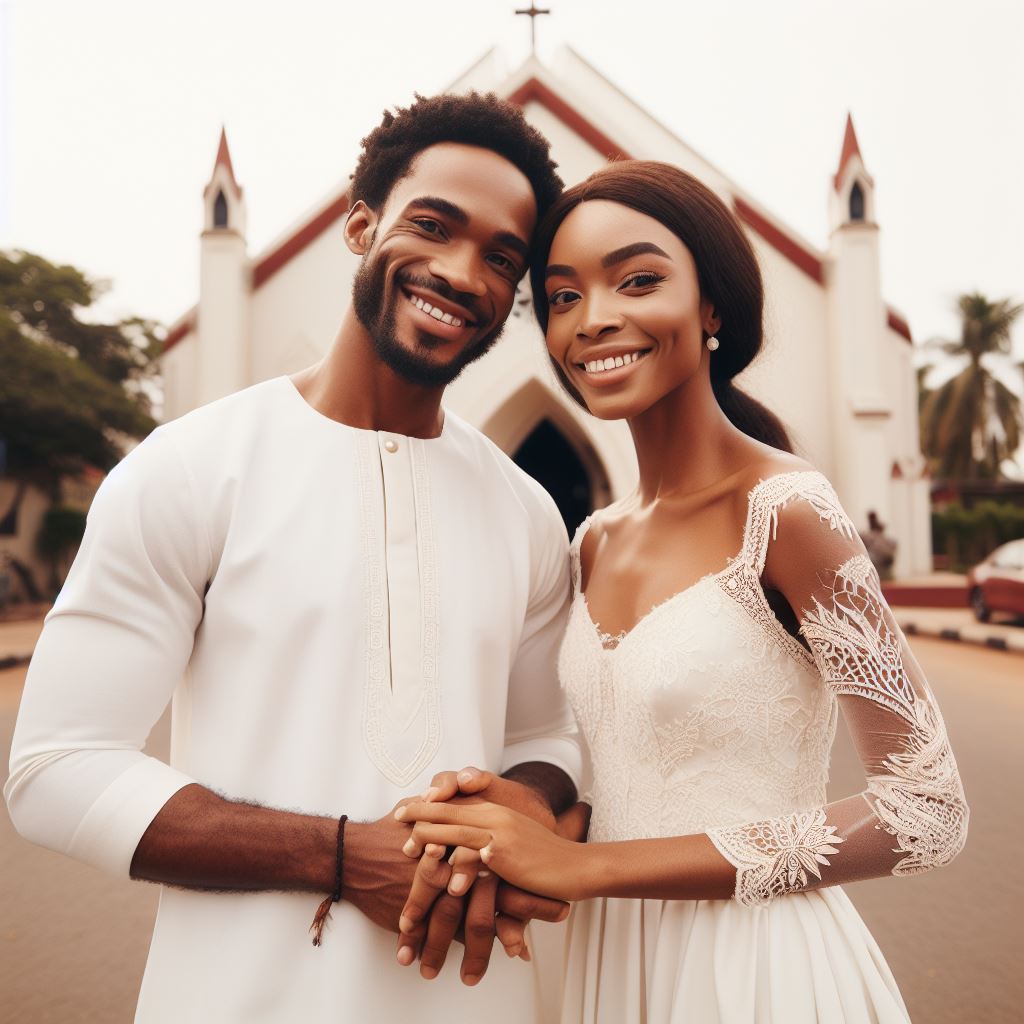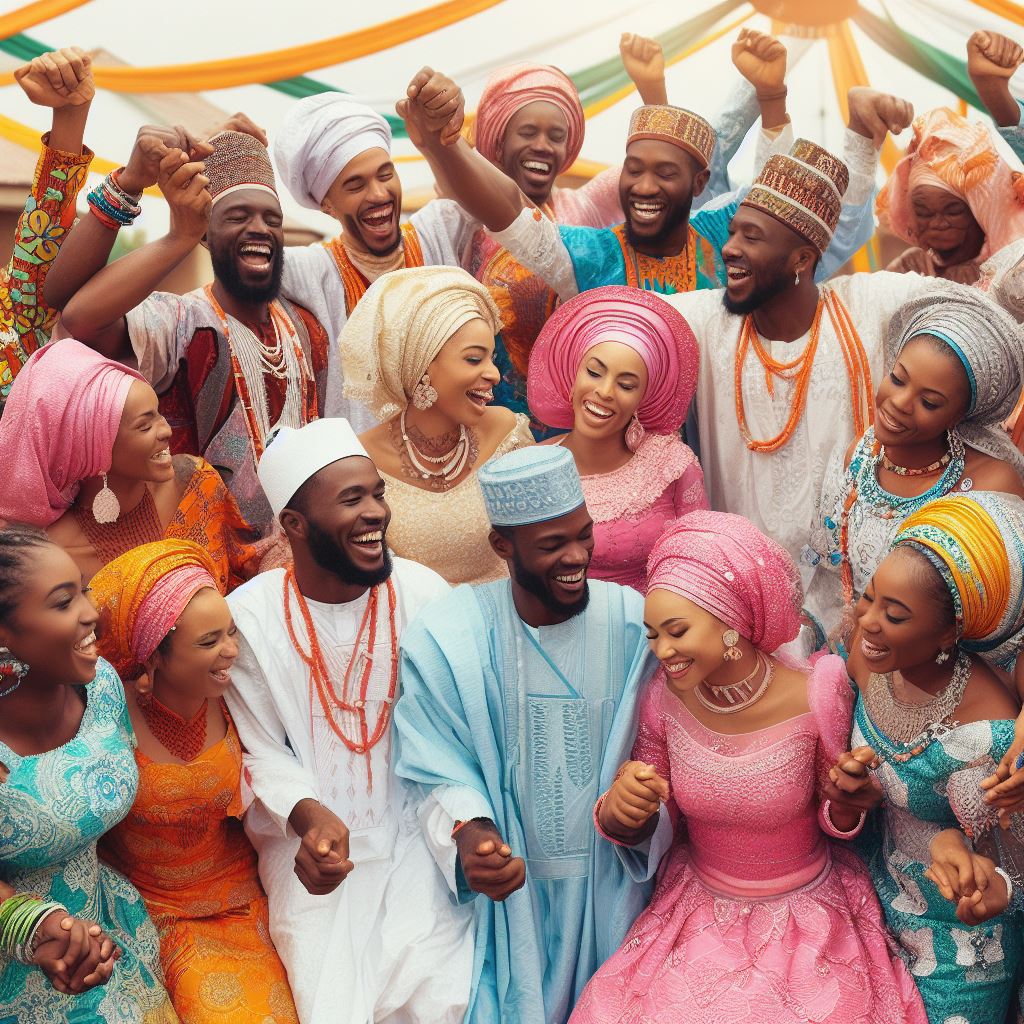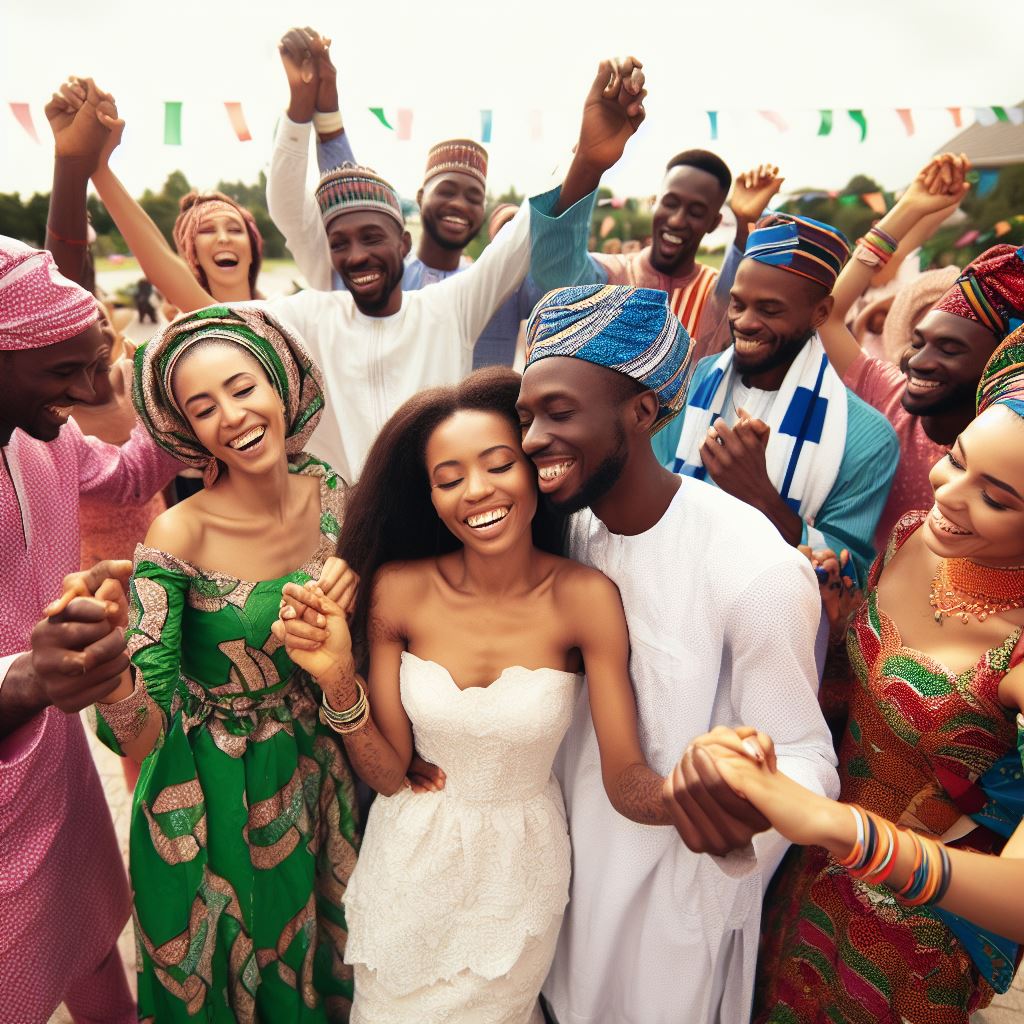Introduction
A. Brief Overview of Marriage in Nigeria
Marriage in Nigeria is a sacred institution that extends far beyond the union of two individuals.
It is deeply rooted in the country’s diverse cultural and religious traditions.
These unions are seen not only as personal commitments but as essential building blocks of society.
They serve as a means of ensuring stability, procreation, and mutual support, thus making the institution of marriage a cornerstone of Nigerian life.
B. Importance of Marriage Counseling in Nigeria
The importance of marriage counseling in Nigeria cannot be overstated.
Nigeria’s immense diversity, with over 250 ethnic groups and a multitude of religious beliefs, often leads to a wide array of challenges in marital relationships.
These challenges can range from issues of cultural compatibility to varying beliefs and practices.
Marriage counseling serves as a vital bridge in navigating these complexities.
It offers couples the tools to better understand each other, communicate effectively, and work through the cultural and religious differences that may arise.
C. Thesis Statement: Exploring the Impact of Religion on Marriage Counseling in Nigeria
This blog post embarks on a journey to explore the intricate relationship between religion and marriage counseling in Nigeria.
Religion in Nigeria is not a monolithic concept; it encompasses diverse faiths and belief systems, each with its own set of values, doctrines, and practices.
As such, religion significantly impacts the entire spectrum of marriage counseling, from the selection of counselors with particular religious affiliations to the methodologies and techniques employed in counseling sessions.
This exploration aims to shed light on how religious beliefs influence the approach to marriage counseling in Nigeria, ultimately affecting the success and outcomes of these critical interventions.
Role of Religion in Nigerian Society
When it comes to marriage counseling in Nigeria, religion plays a significant role in shaping the approach and outcomes.
With the dominant religious beliefs being Christianity and Islam, it is crucial to understand their influence on Nigerian society.
A. Dominant religious beliefs in Nigeria
In Nigeria, Christianity and Islam are the two main religions practiced by a majority of the population.
Christianity is primarily followed in the southern part of the country, while Islam has a stronger presence in the northern regions.
Religious beliefs are deeply ingrained in the Nigerian culture and have a strong influence on various aspects of people’s lives, including marriage and family dynamics.
The teachings and principles of these religions play a vital role in shaping the society’s values and norms.
B. Influence of religion on various aspects of Nigerian culture
Religion in Nigeria extends beyond mere personal beliefs.
It has a profound impact on the entire society, affecting social interactions, cultural practices, and even governmental policies.
One notable area where religion influences Nigerian culture is in marriage customs and practices.
Traditional values and religious teachings guide the expectations, roles, and responsibilities within a marriage.
Religious ceremonies and rituals are integral parts of Nigerian weddings and marital unions.
C. Deep-rooted religious values and their influence on marriage
Religious values are deeply rooted in the Nigerian society, influencing the way marriages are viewed and approached.
For instance, the principles of Christianity and Islam emphasize the importance of commitment, fidelity, and mutual respect in marriages.
Marriage counseling in Nigeria takes into account these religious values as a foundation for guiding couples in resolving conflicts and strengthening their relationships.
Counselors often incorporate religious teachings into their sessions, encouraging couples to seek guidance from their faith and religious community.
The influence of religion in marriage counseling can also be seen in the preference for religious leaders as marriage counselors.
Many couples turn to their religious leaders for guidance and counseling, believing that they possess a spiritual understanding and can provide solutions based on religious teachings.
However, it is important to note that religion should not be the sole focus in marriage counseling.
Counselors should acknowledge and respect individuals’ religious beliefs but also consider other factors that contribute to the development and resolution of marital issues.
Basically, religion plays a pivotal role in marriage counseling in Nigeria.
With Christianity and Islam being the dominant religious beliefs, their principles and teachings shape the values and expectations within Nigerian marriages.
Understanding and incorporating these religious values is crucial for effective marriage counseling in the country.
Read: Addressing Infidelity: Counseling Advice for Nigerian Marriages
Overview of Marriage Counseling in Nigeria
A. Importance of marriage counseling in Nigerian society
- Marriage counseling plays a crucial role in Nigerian society, addressing the challenges faced by married couples.
- It provides a platform for couples to seek guidance, resolve conflicts, and strengthen their relationship.
- By seeking counseling, couples can learn effective communication and conflict resolution skills, leading to healthier marriages.
- Marriage counseling also addresses societal issues, such as domestic violence and gender inequality.
B. Availability and types of marriage counseling in Nigeria
- Marriage counseling services are readily available in Nigeria, offered by licensed professionals, religious institutions, and community organizations.
- Religious institutions, such as churches and mosques, offer counseling services for married couples based on their faith and teachings.
- Secular counseling services are also available, focusing on psychological techniques to address marital issues.
- Some counseling approaches in Nigeria include individual counseling, group counseling, and couple’s therapy.
C. Challenges faced in marriage counseling in Nigeria
- One major challenge is the societal stigma attached to seeking counseling, with couples often fearing judgment and societal backlash.
- Religious beliefs and practices can sometimes hinder the effectiveness of marriage counseling, as certain issues may be seen as taboo.
- Another challenge is the lack of trained and qualified counselors, especially in rural areas, limiting access to quality counseling services.
- Financial constraints also pose a challenge for many Nigerians, as they may not afford the costs associated with counseling services.
Generally, marriage counseling holds significant importance in Nigerian society as it addresses marital challenges, provides guidance, and strengthens relationships.
It is available through various channels, including religious institutions and licensed professionals.
However, challenges such as societal stigma, religious beliefs, limited access, and financial constraints need to be overcome to ensure effective counseling for couples in Nigeria.
Read: Why Marriage Counseling is Gaining Popularity in Nigeria
Religious Counseling Approaches in Nigeria
A. Role of Religious Leaders in Providing Counseling Services
In Nigeria, religious leaders play a crucial role in providing counseling services to married couples.
They are seen as spiritual guides and are trusted by the community in matters of marriage.
Religious leaders offer a safe space for couples to openly discuss their challenges and seek guidance.
Through their knowledge of religious teachings, they provide advice based on moral and spiritual principles.
Many couples find comfort and trust in these counseling sessions, knowing their faith is respected and valued.
B. Integration of Religious Teachings in Marriage Counseling
In Nigeria, religious teachings are an essential part of marriage counseling.
Counselors integrate religious values into therapy sessions to address marital issues from a spiritual perspective.
They help couples understand the importance of faith in their relationship and its impact on their marital life.
Religious teachings guide couples to develop virtues like forgiveness, patience, and humility in their marriage.
By aligning their actions with religious principles, couples can strengthen their bond and resolve conflicts effectively.
C. Utilizing Religious Rituals and Practices in Counseling Sessions
Religious rituals and practices are often incorporated into marriage counseling sessions in Nigeria.
Prayer is considered a powerful tool to seek divine intervention for marriage-related challenges.
Couples are encouraged to engage in joint prayers as a means to connect spiritually and seek reconciliation.
Religious rituals such as marriage blessings, anointing of couples, or reciting sacred verses are performed.
These practices help couples experience a sense of sacredness and renewal in their relationship.
Essentially, religion plays a significant role in marriage counseling in Nigeria.
Religious leaders act as counselors, providing guidance based on spiritual and moral principles.
They integrate religious teachings into counseling sessions, emphasizing the importance of faith in marriage.
Additionally, religious rituals and practices are utilized to create a sacred and transformative environment.
By merging spirituality with counseling, couples in Nigeria find solace and solutions in their marital challenges.
The respect and value given to religion during counseling sessions foster a stronger commitment to their faith and relationship.
Read: Success Stories: Nigerian Couples Transformed by Counseling

Positive Impact of Religion on Marriage Counseling in Nigeria
A. Strong belief in marital commitment and faithfulness
In Nigeria, religion plays a significant role in shaping individuals’ beliefs and values about marriage.
The strong religious beliefs held by many Nigerians often emphasize the sanctity of marriage, promoting marital commitment and faithfulness.
These beliefs serve as a foundation for successful marriage counseling in the country.
Get Your Wedding Business Featured on MarriageInNigeria.ng
Build trust, show up on Google, and attract more clients with a done-for-you profile post.
Get Featured NowB. Supportive religious community for couples seeking counseling
Religion in Nigeria provides couples with a supportive community that often aids the process of marriage counseling.
Religious congregations offer a safe space where couples can seek guidance and share their struggles with like-minded individuals who offer empathy, understanding, and advice.
C. Faith-based reconciliation and forgiveness approaches
Religion in Nigeria emphasizes the importance of forgiveness and reconciliation, which can positively impact marriage counseling.
Many religious teachings encourage couples to approach their marital issues with an open heart, seeking forgiveness and working towards reconciliation rather than resorting to separation or divorce.
This strong emphasis on commitment, support, forgiveness, and reconciliation within religious communities has significant positive implications for marriage counseling in Nigeria.
1. Guidance through religious teachings
- Religion provides couples with a framework for understanding the purpose and importance of marriage.
- Religious teachings guide couples through difficult moments, offering specific instructions on how to navigate challenges and maintain healthy relationships.
2. Accountability
- Religious communities in Nigeria often hold individuals accountable for their actions within their marriages.
- This accountability can be instrumental in helping couples confront and address their issues in a responsible and mature manner, leading to effective counseling outcomes.
3. Accessible counseling resources
- Religious institutions in Nigeria typically offer various resources, such as pastoral counseling services or couples’ retreats, that are easily accessible to couples seeking assistance.
- These resources provide guidance, support, and practical advice for resolving marital conflicts.
4. Promotes a sense of belonging
- Religious communities create a sense of belonging for couples, making them feel welcomed and understood.
- This sense of belonging can alleviate feelings of isolation and encourage couples to engage in marriage counseling without fear of judgment or stigmatization.
5. Spiritual dimension to counseling
- Religion adds a spiritual dimension to marriage counseling in Nigeria, helping couples find solace, strength, and hope in their faith.
- This spiritual component often enables couples to draw upon their beliefs and values to navigate challenges, leading to significant positive outcomes.
In a society where religion holds immense influence, the positive impact of religion on marriage counseling in Nigeria cannot be overstated.
From promoting commitment and faithfulness to providing a supportive community and encouraging reconciliation, religion plays a crucial role in helping couples navigate their marital challenges.
By incorporating religious teachings, accountability, accessible resources, a sense of belonging, and a spiritual dimension, marriage counseling in Nigeria can effectively address the diverse needs and concerns of couples, fostering healthier and more fulfilling marriages.
Read: Traditional vs. Modern Approaches: Marriage Counseling in Nigeria
Negative Impact of Religion on Marriage Counseling in Nigeria
In Nigeria, religion plays a significant role in the way marriage counseling is conducted.
While religion can bring comfort and guidance to couples seeking counseling, it can also have negative impacts.
This section discusses some of the adverse effects of religion on marriage counseling in Nigeria.
A. Stigmatization of divorced individuals in religious communities
One major negative impact of religion on marriage counseling in Nigeria is the stigmatization of divorced individuals within religious communities.
Divorce is often seen as a failure and a violation of religious principles.
As a result, divorced individuals may be ostracized or judged harshly by their religious communities, making it difficult for them to seek help or guidance through counseling.
This stigma can prevent individuals from receiving the support they need to heal and rebuild their lives.
B. Dogmatic views and restrictions on certain counseling methods
Religious dogmas and restrictions can also impede effective marriage counseling in Nigeria.
Some religions have strict guidelines on marital issues such as divorce, contraception, and gender roles.
These dogmatic views can limit the solutions that counseling professionals can offer to couples.
If counselors are bound by religious doctrines and unable to provide certain interventions or advice that may go against these doctrines, couples may not receive the comprehensive support they require.
C. Religious conflicts and differences affecting counseling dynamics
The religious diversity in Nigeria can also create conflicts and differences that impact the effectiveness of marriage counseling.
Nigeria is a country with a mix of Christians, Muslims, and various traditional religion adherents.
When couples from different religious backgrounds seek counseling, their religious differences can become a source of conflict.
Ineffective counseling may result if counselors lack training to handle and resolve religious conflicts in couples.
In general, while religion can offer solace and guidance to couples in Nigeria seeking marriage counseling, it can also have negative implications.
The stigmatization of divorced individuals, dogmatic views, restrictions on counseling methods, and religious conflicts can hinder the effectiveness of counseling.
It is vital for counseling professionals in Nigeria to be aware of these negative impacts and the role religion plays in shaping attitudes towards marital issues.
By acknowledging and addressing these challenges, counselors can provide more inclusive and effective support to couples in need.
Learn More: Inspirational Quotes on Marriage from Nollywood
Strategies for Effective Religion-Integrated Marriage Counseling
A. Promoting tolerance and inclusivity in religious communities
One of the key strategies for effective religion-integrated marriage counseling in Nigeria is to promote tolerance and inclusivity within religious communities.
This involves creating an atmosphere where couples feel accepted regardless of their religious background and are encouraged to engage in open dialogue.
Counselors can organize community events that bring together couples from different religious backgrounds to foster understanding and tolerance.
These events can include panel discussions, group activities, and workshops focused on promoting respect, empathy, and open-mindedness.
By promoting tolerance and inclusivity, religious communities can play a vital role in reducing stigmas associated with interfaith marriages and create an environment where couples feel supported in seeking marriage counseling.
B. Encouraging collaboration between religious leaders and professional counselors
Another crucial strategy for effective religion-integrated marriage counseling is to encourage collaboration between religious leaders and professional counselors.
This collaboration can enhance the quality and effectiveness of counseling by drawing on the wisdom and spiritual insights of religious leaders, while also benefiting from the professional expertise of counselors.
Workshops and seminars can be organized to facilitate communication and collaboration between these two groups.
The workshops can focus on topics such as understanding the psychological needs of couples, effective communication techniques, and strategies for addressing marital conflicts in a religiously sensitive manner.
Through such collaboration, counselors can gain a deeper understanding of the religious beliefs and practices of their clients, which can contribute to more culturally sensitive and effective marriage counseling.
C. Adapting counseling approaches to respect and incorporate religious beliefs
To enhance religion-integrated marriage counseling in Nigeria, actively adapt approaches to respect and include religious beliefs.
Counselors should familiarize themselves with the religious traditions of their clients and be respectful and sensitive to their beliefs.
This can be achieved by engaging in ongoing education and seeking guidance from religious leaders when necessary.
Effective counselors will also understand the importance of spiritual well-being in marriage and help couples find ways to strengthen their spiritual connection.
They can integrate religious rituals, prayers, or meditation practices into the counseling process, if appropriate and desired by the couples.
By adapting counseling approaches to respect and incorporate religious beliefs, counselors can create a safe and supportive space for couples to explore and address their marital challenges, while honoring their religious commitments.
In essence, effective religion-integrated marriage counseling in Nigeria requires strategies that promote tolerance and inclusivity, encourage collaboration between religious leaders and professional counselors, and adapt counseling approaches to respect and incorporate religious beliefs.
By incorporating these strategies, counselors can provide a more holistic and effective approach to marriage counseling that acknowledges and respects the religious values and traditions of their clients.
See Related Content: The Role of Courtship in Shaping Nigeria’s Marriage Definition
Conclusion
Religion plays a significant role in marriage counseling in Nigeria. It serves both as a source of support and a potential obstacle.
The deeply rooted religious beliefs of Nigerians influence their perceptions, expectations, and decision-making processes within their marriages.
Marriage counselors must navigate the complexities that arise due to religious influences.
They need to understand and respect the religious values of their clients while providing effective counseling strategies.
This balance is crucial to ensure successful outcomes in counseling sessions.
Moreover, there are opportunities for improvement within marriage counseling in Nigeria.
It is important to incorporate cultural and religious sensitivities into counseling practices.
Marriage counselors should receive adequate training on religious diversity to better serve their clients.
Finding a balance between religious values and effective counseling practices is vital in Nigeria.
Allowing religious beliefs to guide counseling sessions can provide a sense of comfort and familiarity for clients.
However, counselors must also ensure that religious teachings do not hinder the overall progress and well-being of their clients.
Religion significantly influences marriage counseling in Nigeria, and it’s impossible to overlook this impact.
It is crucial to acknowledge the complexities that arise from religious influences and strive for improvement.
By finding a balance between religious values and effective counseling practices, counselors can provide meaningful support to couples while respecting their religious beliefs.




